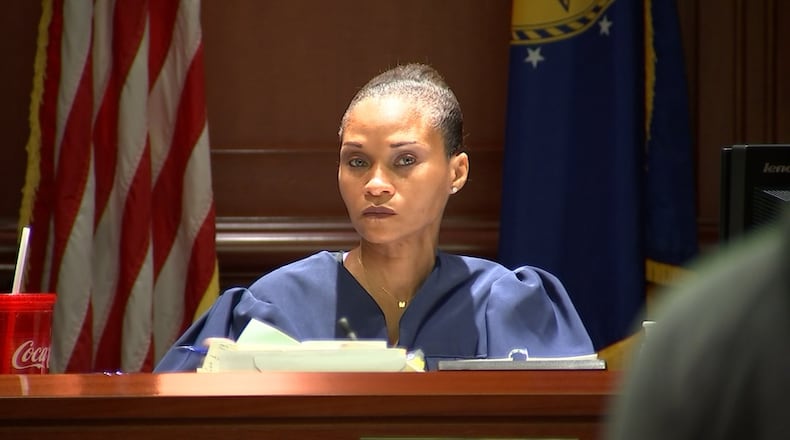It’s clear that Terrinee Gundy, the Atlanta Municipal Court judge who was suspended by the Georgia Supreme Court last week, is not a morning person.
In a nearly 10-month period starting Sept. 1, 2015, Gundy arrived late for her 8 a.m. court calendar call 149 times. In fact, of those tardies, she came in after her second court call, which was 10 a.m., 119 times.
That’s remarkable because, to my accounting, there were about 205 workdays during that time frame.
On top of perpetual tardiness, Gundy, who was appointed to the post in 2013 by Mayor Kasim Reed, also seemed to not like even showing up for work. The files indicate she missed 122 days from the start of 2016 through the first half of 2018. She did have a doctor’s note for about half of the 63 days she missed in 2017.
In all, the city had to call in a rent-a-judge for at least 80 of those days while still paying her salary. Meanwhile, during the days she actually showed up, attorneys, court personnel, cops and those awaiting their cases to be heard, had to wait. And wait.
The judge’s attendance got better (or less bad) in the last half of 2017, being late only 62 times. Although it seems she might have had an idea she was being watched by the Judicial Qualifications Commission, the state organization that investigates judges. In January 2019, Fani Willis, who is now Fulton County’s DA, filed the case against Gundy. Willis was then working as a contract attorney with the JQC.
Now, I get it, the role of an Atlanta Municipal Court judge is hardly glamorous. Each morning you’re faced with the flotsam and jetsam of society: drunks, drug addicts, the homeless, mentally ill, as well as jaywalkers, speeders and annoying folks who blow through stop signs and want to come to court to argue their constitutional rights.
The gig may not be what you dreamed of while toiling through law school. But it is the job you signed up for and it paid $182,000 in 2018 (the last year I could find). So one should don the robes and show up until they can latch onto something higher up the judicial food chain.
Credit: Bob Andres
Credit: Bob Andres
The Supreme Court suspended Gundy for 90 days, noting it was among the most harsh sentences it has meted out to a judge, short of removal from the bench. But the justices said they were agreeing to the consent decree (kind of a plea deal) with “hesitation,” hinting they wanted to go higher up the punishment scale.
That was because in March 2017 Gundy seemed to be in a hurry to get out of her courtroom and refused to hold bond hearings for six people locked up on city violations. They spent an extra week in the city slammer until the city’s public defender appealed to state court to get them out. Gundy then freed them on signature bond.
Rosalie Joy, who spent nearly 30 years in Atlanta’s court as a public defender, including seven as interim director of that office, believes that pushing back against Gundy’s actions in that case got her run off from the city.
“A city attorney called me and was yelling, saying I had embarrassed the city,” Joy said. “Filing that (habeas corpus to free the prisoners) cost me my job.”
Joy, who left in 2018, now works in Washington, D.C. She did not hold back when I asked about Gundy. She thinks the judge should have been removed, not suspended.
“She was a reign of terror,” Joy said. “She embarrassed court personnel. She ridiculed prosecutors and defense attorneys. She made people afraid and made it generally miserable there. ...
“My opinion, and that of my colleagues, was that she was not fair, was arrogant and was as uncaring of the citizens of Atlanta as she was with those who worked in the courthouse. She was empowered to do so because her relationship with the mayor was widely known.”
Gundy and Reed are personal friends.
Gundy politely referred me to her attorney, Gabe Banks. I reached out to the former mayor and did not reach him.
Banks, formerly a gang crime prosecutor with the Fulton DA’s office, said that “imposing the most harsh punishment, 90 days, was inappropriate.”
He noted that Cary Hays III, the chief magistrate of Crawford County, was suspended for just 30 days after slamming a shackled prisoner against the wall in a courtroom hallway. Banks said it has been argued that Hays’ misconduct was a one-time occasion, not a pattern. “But (hers) wasn’t a crime,” Banks said. “The public should question this.”
“I feel she has gotten a bad deal,” said Banks, noting that Gundy has been the focus of dozens of newspaper articles and TV stories. “This is the only judge who has gotten this kind of media attention.”
Perhaps it’s because her case has slogged on for years. Or was it because she spent lavishly, according to one AJC story, to have “three ‘flame of excellence’ sculptures made of glass that cost a combined $1,800; engraved envelopes and other stationery at a cost of $4,156; and $870 in beverage napkins for a party after Reed’s annual Masked Ball?” Or it may be because the city improperly paid $56,000 on lawyers’ fees to fight her private legal case. Or maybe it was the loud party, complete with a marching band, that got her cited by Atlanta police.
My unpaid non-legal advice is simple: Return to work this fall and be a better judge.
And get a good alarm clock.
About the Author
Keep Reading
The Latest
Featured





